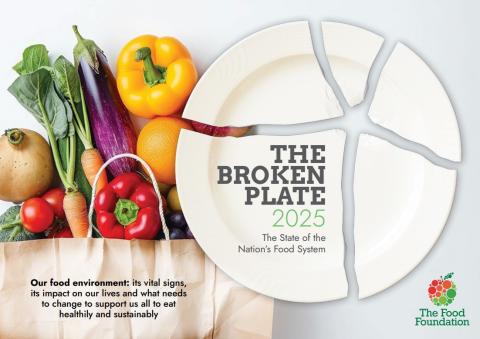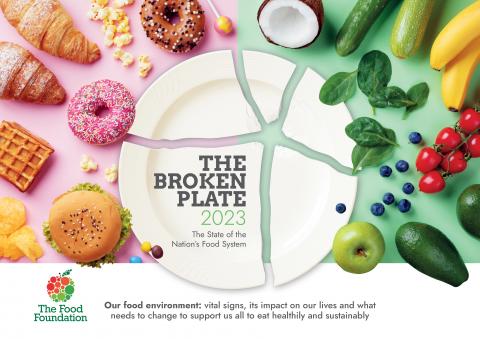The Broken Plate is The Food Foundation’s annual flagship report, presenting vital metrics revealing the health of our food system and its impact on our lives.
It demonstrates that the UK’s food system and our food environments have led the UK into a national health crisis, with children and households on low incomes suffering the severest health consequences.
Each year The Food Foundation publishes a new edition of The Broken Plate, providing updated statistics for key metrics and new commentary on the direction of travel.
Businesses and Governments must act to ensure that the environment in which we live supports everyone in being able to access and afford a healthy and sustainable diet.
“Improving healthy eating requires, at the minimum, an understanding of influences on nutrition and its consequences; and monitoring of progress. Broken Plate does both of these admirably and fulfils an urgent national need.”
Sir Michael Marmot

Key Stats - food environment metrics
The poorest fifth of UK households would need to spend 47% of their disposable income on food to meet the cost of the Government-recommended healthy diet. This compares to just 11% for the richest fifth.
22% of workers in the food system earn the National Minimum Wage or below, compared to 8% of workers across the whole economy.
More healthy foods are nearly three times as expensive per calorie as less healthy foods
More sustainable plant-based alternatives are approximately 60% more expensive than dairy milk.
More than 1 in 4 (26%) places to buy food are fast-food outlets.
Just 1 major UK food retailer, caterer or restaurant chain currently reports publicly on sales of healthy foods, vegetables, and animal vs plant-based proteins.
Only 7% of breakfast cereals and 4% of yogurts marketed to children are low in sugar.

Key Stats - food outcome metrics
The percentage of children with obesity in their first year of school has risen by nearly 50% in one year, affecting twice as many
children in the most deprived fifth compared with the least deprived fifth.
Children in the most deprived tenth of the population are on average over 1cm shorter than children in the least deprived tenth by Year 6 (age 10–11).
Nearly 10,000 diabetes-related amputations are carried out on average per year, an increase of 23% in five years.
Healthy life expectancy in the most deprived tenth of the population is 20 years less for women and 18 years less for men than in the least deprived tenth.
If current trends continue then, amongst children born this year, 1 in 4 will suffer overweight or obesity by the time they start school, rising to 3 in 4 by age 65.
If things continue as they are, by 2050 emissions from the food system will be four times higher than the level that is needed if the UK is to meet its net zero target.









